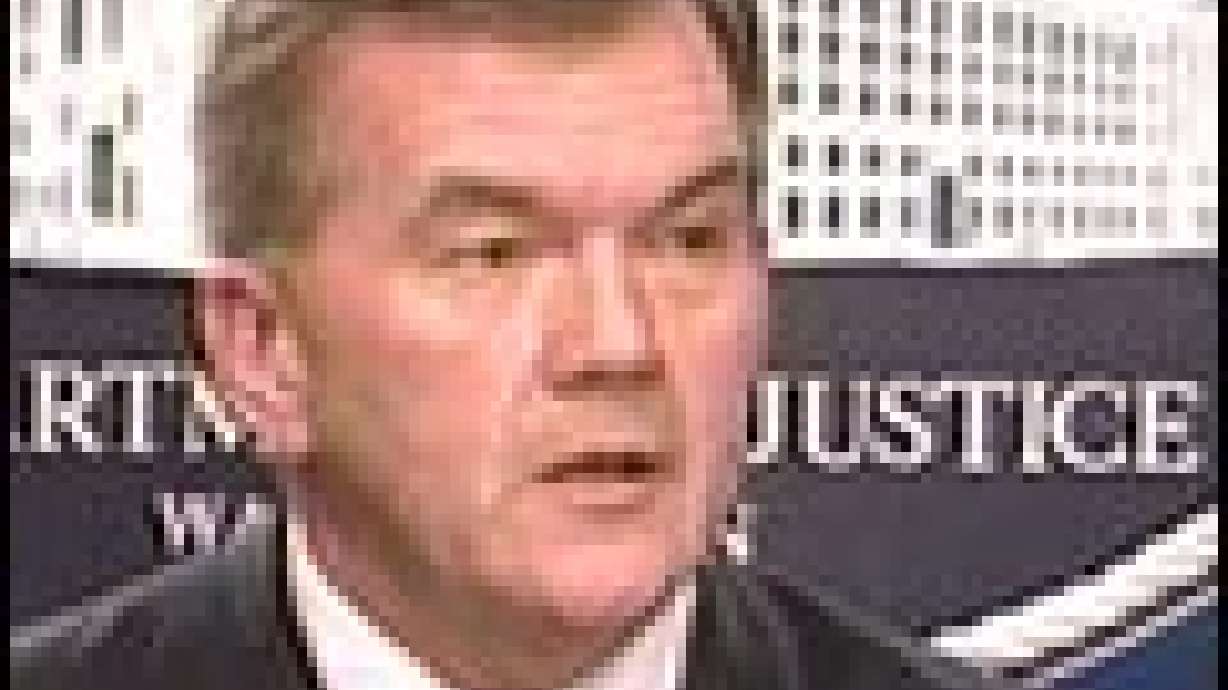Estimated read time: 5-6 minutes
This archived news story is available only for your personal, non-commercial use. Information in the story may be outdated or superseded by additional information. Reading or replaying the story in its archived form does not constitute a republication of the story.
WASHINGTON (AP) -- The Bush administration Friday raised the national terror alert from yellow to orange, the second-highest level in the color-coded system. Attorney General John Ashcroft cited an "increased likelihood" that the al-Qaida terror network would attack Americans, either at home or abroad.
Ashcroft said apartment buildings, hotels or other "lightly secured targets" in the United States could be vulnerable. The attorney general also said terrorists might seek "economic targets, including the transportation and energy sectors, as well as symbolic targets and symbols of American power."
He told a Justice Department news conference the decision was based on an increase in intelligence pointing to a possible attack by Osama bin Laden's organization timed to coincide with the hajj, the annual Muslim pilgrimage to Mecca in Saudi Arabia, Islam's holiest site. The holy period begins Saturday and ends mid-February.
Tens of thousands of pilgrims are traveling during the period before and after the five-day Hajj, straining the ability of security officials to keep track of militants who might use the occasion to reposition themselves.
The change in the alert level will trigger a government-wide increase in security precautions.
"We are not recommending that events be canceled," nor should individuals change their travel, work or recreational plans, Ashcroft said.
Even so, Homeland Security Secretary Tom Ridge urged Americans "in the days ahead, take some time to prepare for emergencies." As an example, Ridge suggested that families devise plans for contacting one another if separated by an emergency.
"Terrorist attacks can really take many forms," he said.
White House press secretary Ari Fleischer said the decision to raise the alert level was made after the president's daily CIA and FBI briefings and upon the recommendation of Ashcroft and Ridge. That recommendation was delivered after the homeland security council spent over an hour poring over new intelligence in the White House situation room.
When given the recommendation, Bush said, "I agree. Change the code," according to Fleischer.
The alert has been at code yellow, or "elevated," which is the middle of a five-point scale of risk developed after the Sept. 11, 2001 attacks. It was last raised to orange in September and stayed there for two weeks to coincide with the first anniversary of the attacks. The highest alert level is red.
Ashcroft said there was a "sound basis" for the decision. However, he declined to go beyond that.
"This decision for an increased threat condition designation is based on specific intelligence received and analyzed by the full intelligence community. This information has been corroborated by multiple intelligence sources," Ashcroft said.
Other officials said U.S. preparation for a possible war with Iraq was also a factor in the decision to raise the alert status.
"Since September the 11th, the U.S. intelligence community has indicated that the al-Qaida terrorist network is still determined to attack innocent Americans, both here and abroad," Ashcroft said.
He said the recent bombings of a nightclub in Bali, Indonesia, and of a resort hotel in Mombasa, Kenya, "demonstrate the continued willingness of al-Qaida to strike at peaceful, innocent civilians."
Ashcroft also said the global terror network could even try to mount a chemical, biological or radiological attack.
Ridge said local and state law enforcement agencies, the nation's governors, many mayors and Congress had been informed in the change in the alert status. "We're asking all these leaders to increase their security and vigilance wherever necessary," he said.
Ridge outlined the threat Friday morning in a conference call with the nation's governors, urging them to increase their security efforts and discussing confidential security precautions. He also plans to talk to congressional leaders and to several dozen business leaders who control critical infrastructure, which could include electric power grids, dams or nuclear plants.
The public will likely see some changes, such as delays at some facilities and events and some buildings will be harder to enter. Other precautions, however, will be secret and go largely unnoticed by most people.
Examples cited by Fleischer included more random inspections of baggage at airports, tighter scrutiny at U.S. orders and more checks of cargo coming into U.S. ports.
Government officials have grown increasingly concerned about the likelihood of terrorist attacks within the United States as intelligence sources are reporting an increase in terrorist activity or "chatter." One official, speaking on condition of anonymity, said this activity appeared to be peaking and was rivaling that seen before the Sept. 11, 2001 terror attacks.
Officials are increasingly worried that al-Qaida and other terrorist groups might try to use chemical, biological or radiological weapons such as a "dirty bomb" that spews radiation into the atmosphere over a relatively confined area. There is no evidence, they say, that al-Qaida has acquired nuclear weapons but there is ample proof that it was working with a variety of harmful substances.
There is also concern that individual al-Qaida member or sympathizers could attempt small-scale attacks, such as a shooting or suicide bombing.
The State Department on Thursday issued a worldwide caution to Americans about a greater risk of terrorism, including "suicide operations, assassinations or kidnappings" as well as use of chemical or biological agents.
The reasoning behind Bush's decision was unclear early Friday. One U.S. official said there was no specific threat made, but the increase in chilling U.S. intelligence -- much of it corroborated -- led the administration to determine that there was sufficient reason to put Americans on notice.
U.S. preparation for a possible war with Iraq and Saturday's start of the Hajj were also key factors in the decision to raise the alert status. Muslim holy periods tend to raise jitters about terrorist activity among U.S. intelligence officials.
(Copyright 2003 by The Associated Press. All Rights Reserved.)









